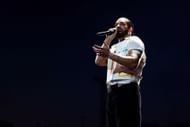RBX has reportedly filed a lawsuit against Spotify for alleged fake streams, citing Drake as an example. The lawsuit states that a significant part of the rapper's numbers on the streaming platform are allegedly fake, but it hasn't named him as a defendant.
As per a report by Ratings Game Music, published on October 29, Drizzy was the most-streamed rapper in October with 80.8 million. The rapper has consistently dominated these charts over the years.
However, RBX, whose real name is Eric Dwayne Collins, has claimed that these streaming numbers are allegedly fake. He filed a lawsuit against Spotify at the California District Court on Sunday, November 2. In it, he states that the streaming platform has allegedly “turned a blind eye” to billions of fake streams across various artists.
The lawsuit stated (via Rolling Stone):
“Every month, under Spotify’s watchful eye, billions of fraudulent streams are generated from fake, illegitimate, and/or illegal methods.” It explains that this “causes massive financial harm to legitimate artists, songwriters, producers, and other rightsholders.”RBX has used Drake's numbers as an example in the lawsuit, but hasn't named him as a defendant. He alleges that a significant portion of the rapper's numbers are “inauthentic and appeared to be the work of a sprawling network of Bot Accounts.”
As per the lawsuit, research on the rapper's numbers on Spotify allegedly shows an "abnormal VPN usage". For example, around 25,000 streams of his track, No Face, originated in Turkiye in four days in 2024, "but were falsely geomapped through the coordinated use of VPNs to the United Kingdom in [an] attempt to obscure their origins.”
It also claimed that Drizzy's streaming numbers had many accounts that are “geographically concentrated around areas whose population could not support” large streaming volumes. Moreover, it alleges a slower decay rate and a higher "irregular uptick months” for the rapper's songs.
It states:
“As a result, Drake’s music accumulated far higher total streams compared to other highly streamed artists, even though those artists had far more ‘users’ than Drake.”The lawsuit delves into further details about the rapper's streaming numbers, but it hasn't mentioned how the plaintiffs obtained the detailed data for their research.
Spotify responds to fake streaming allegations with Drake and other artists
 Wireless Festival 2025 - Day One (Image Source: Getty)
Wireless Festival 2025 - Day One (Image Source: Getty)As per Rolling Stone, a spokesperson from Spotify denied the allegations and claimed that the streaming platform has been working to remove bots. He added that the company does not get any benefit from the fake streaming numbers either, saying:
“We cannot comment on pending litigation. However, Spotify in no way benefits from the industry-wide challenge of artificial streaming. We heavily invest in always-improving, best-in-class systems to combat it and safeguard artist payouts with strong protections like removing fake streams, withholding royalties, and charging penalties. “Our systems are working: In a case from last year, one bad actor was indicted for stealing $10 million from streaming services, only $60,000 of which came from Spotify, proving how effective we are at limiting the impact of artificial streaming on our platform,” he added.Meanwhile, Drake or his team hasn't responded to these accusations made by RBX at the time of writing.
Why did you not like this content?
- Clickbait / Misleading
- Factually Incorrect
- Hateful or Abusive
- Baseless Opinion
- Too Many Ads
- Other
Was this article helpful?
Thank You for feedback
Edited by Aditya Singh

.jpg) 5 hours ago
2
5 hours ago
2
 English (US)
English (US)